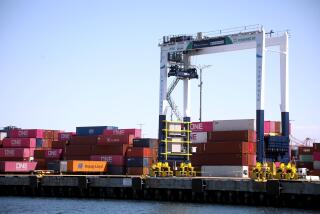New Center at UC Irvine Will Push Research Into Fuel Cells
- Share via
Researchers at UC Irvine are teaming with corporate and government sponsors to launch the nation’s first university-based center for research and development of fuel cells, a technology long touted as the best hope for a future of clean energy generation.
The National Fuel Cell Research Center at UCI, to be unveiled this morning at UCI’s School of Engineering, is intended to develop cost-efficient technologies that can power industry, light homes and even propel automobiles.
Fuel cells create electricity by breaking down hydrogen in a chemical reaction. Although the process has been around for more than a century, recent advances make the nonpolluting energy source commercially feasible within a few years.
UCI administrators declined to comment Wednesday on the new center, preferring to reserve their remarks for this morning’s planned events.
But power industry sources said the center will help replace the pure research lost as deregulation of the power utilities dries up their funding.
The UCI center will focus mainly on fuel cells for electrical generation, rather than automotive uses. Most auto makers already have major initiatives underway to develop fuel cells for passenger cars.
“It will be an extremely valuable addition to the industry’s efforts,” said John Leeper, advanced generation projects manager for Edison Technology Solutions. The Irwindale company, a unit of Edison International, is a sponsor of the new UCI lab.
Those efforts include billions of dollars of research by private industry, including auto makers and companies such as Energy Research Corp.
The Connecticut firm, a co-founder of the new research center, recently concluded an 18-month demonstration of a two-megawatt fuel cell that provided electricity for about 2,000 homes in Santa Clara in Northern California.
The UCI center “marks the maturing of our industry as we decide to work together,” said Paul Eichenberger, head of business development for Energy Research.
He said the electricity generated by his company’s fuel cell plant in Santa Clara cost $23,000 per kilowatt, compared with $500 per kilowatt for electricity generated by a conventional gas turbine power plant.
Fuel Cells International Inc., also based in Connecticut, has sold about 100 small fuel cells capable of generating about 200 kilowatts, said Edison’s Leeper. The cells cost $600,000, but the U.S. Department of Energy reimbursed buyers $200,000.
Until the cost of fuel cell-generated electricity is close to that of gas turbine electricity, the industry just won’t be competitive, said Eichenberger. “Research like the research that will be done at UCI is how we get costs down,” he said.
Leeper said he believes that widespread commercial applications for fuel cells are about five years away.
“But you have to have companies interested in making the components that go into the cells in order for production of fuel cells to become cost-efficient,” he said.
Officials at UCI have long been proponents of marrying academic and commercial research to promote real-world uses for technology. That attitude, and the fact that the university’s engineering school already houses the nation’s largest research center for gas turbine power generation, made it the logical place for the fuel cell research center, Eichenberger said.
More to Read
Inside the business of entertainment
The Wide Shot brings you news, analysis and insights on everything from streaming wars to production — and what it all means for the future.
You may occasionally receive promotional content from the Los Angeles Times.










